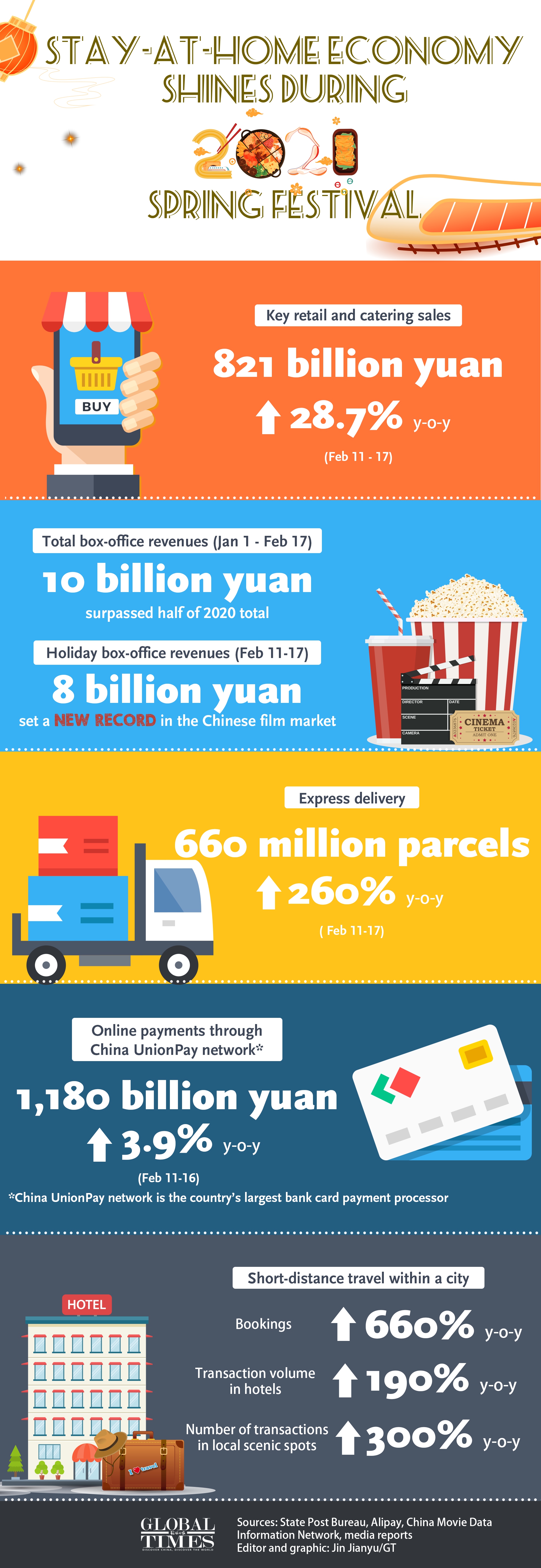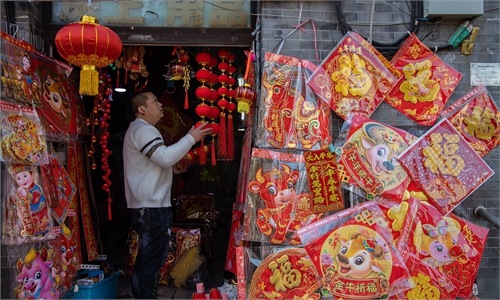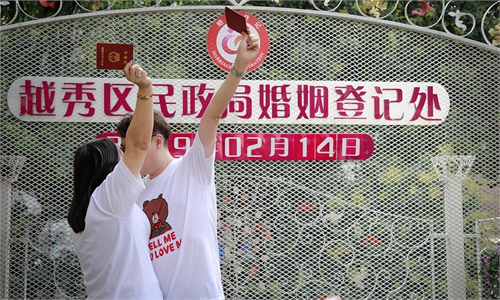Year of Ox Spring Festival signals persisting recovery
Virus control policies, feeling of safety spur local travel boom

Stay-at-home economy shines during 2021 Spring Festival Infographic: Jin Jianyu/GT
Robust consumption during the Year of the Ox Spring Festival holidays, with crowded cinemas and scenic sites seen across the country amid a stay-put policy introduced to ward off a possible winter spike of COVID-19, again validated strong consumer confidence in the world's second-largest economy, analysts said on Wednesday.
The brisk, but most importantly, stable performance of retail sectors for the Spring Festival holiday season, which began on February 11 and wrapped up on Wednesday, is seen as a good sign for economic performance for the first quarter as well as for the whole year by economists.
The 2021 Spring Festival performance came as entirely different to that of the 2020, when the country implemented strong and strict measures after the virus' flash outbreak with maximum effects, effectively sealing off the catering, cinema, tourism and transportation sectors.
During the weeklong holidays, key retail and catering enterprises nationwide posted combined sales revenue of 821 billion yuan, up 28.7 percent year-on-year, the Ministry of Commerce said on Wednesday.
Chinese tourists showed more interest in nearby destinations. In Beijing, there was a 730 percent increase in the number of in-city sightseeing, at 4.91 million, Beijing municipal tourism authorities said on Wednesday.
Parks and winter sports venues in China's cosmopolitan cities witnessed dense crowds unseen in other years and cinemas filled up with people seeking a pastime.
China's box-office revenues in the seven days of the Spring Festival holidays reached 7.5 billion yuan ($1.16 billion) as of Wednesday, according to real-time data from ticket platform Dengta showed.
Online sales were brisk with the Chinese express delivery sector having delivered 365 million parcels in the first five days of the weeklong holidays, up 224 percent over the same period last year.
China's transportation sector handled 77.24 million passengers during the first six days of the Spring Festival holidays, including 17.47 million railway trips and 54.82 million road trips.
Bullish consumption
In response to government advice to "stay put" and avoid gatherings, many people chose to celebrate the most important festival in the towns and cities where they habitually live and work instead of going back to their hometown for family reunions - the true essence of this special festive season. Services catering to lifestyle in cities saw increased prices and new features were added to the most important holiday which usually revolved around family reunions.
Lian Ping, head of Zhixin Investment Research Institute, estimated that between one-quarter and one-third of migrant workers heeded the calls to stay in the cities and shun holiday travel.
"On the first day of the Lunar New Year, I found through an app that all the cinemas near me only have one vacant seat! It is bizarre but also understandable," a Beijing resident surnamed Shan told the Global Times on Wednesday. Shan noted that movie ticket prices soared and so had prices for personal care services such as manicures.
On-demand delivery platform Dada said Wednesday that orders where the sender and the receiver are not in the same city doubled from last year as people sent gifts to family and friends in rural areas. Many of those sending orders were generated in South China's Guangdong Province, a manufacturing base with a large number of migrant workers.
Sending Lunar New Year gifts moved from the virtual world onto the cloud, according to Dada, with general items sales up 190 percent between February 4 and Tuesday and items such as congee and milk powder for the elderly particularly trending.
According to online takeout platform Eleme.com, takeout orders for hot pot and milk tea increased by over 200 percent this year.
There was also a 60 percent increase in the sales of gastrointestinal drugs and a 150 percent in sales for hangover remedies, Eleme data showed, as Chinese people would choose to eat rich food at dinner parties during the holidays.
As consumption contributes about 65 percent of China's economic growth, some believe robust holiday sales bode well for the world's second-largest economy in the coming months, paving the way for good first quarter data and that of the whole year.
In less than five months, Chinese people were able to check on the barometers of retail sales on four occasions - the weeklong National Day holidays in October 2020, the Double 11 online shopping festival on November 11, 2020, the New Year holidays and the just-concluded Spring Festival holidays, noted Cao Heping, a professor at the School of Economics at Peking University.
"Each reading reassures confidence in a recovering Chinese economy," Cao told the Global Times on Wednesday.
As one of the most important shopping seasons, the Spring Festival Golden Week holidays saw sales revenues topping 1 trillion yuan for the retail and catering sectors in 2019, one year before the virus struck. The country also received 415 million tourists during that period.
In 2020, the sudden outbreak of the virus and China's containment measures resulted in a 20.5 percent year-on-year drop in retail sales for January and February.

Moviegoers watch Detective Chinatown 3 at a cinema in Taiyuan, North China's Shanxi Province on the first day of the Year of the Ox. Photo: cnsphoto
Safe holidays
Wearing facial masks and observing social distancing became a new normal all over China during the festival season. People who still traveled were subject to a slew of virus prevention measures, such as needing a valid nucleic acid test and temperature checks, as well as health observation.
The number of confirmed COVID-19 cases within China had slowed to a trickle before the festival with no local cases for several consecutive days. Only one new local case was reported on Monday in Shijiazhuang, a city that just recovered from a COVID-19 outbreak.
"Those imported cases and the single local case pose no threat to China. If no more local new cases are reported in the next 14 days, we can claim victory for our Spring Festival's strict virus prevention measures," Wang Guangfa, a respiratory expert at Peking University First Hospital, told the Global Times on Wednesday.when???
The sporadic outbreaks in Northeast China and North China rang bells for the country, so people still stay vigilant during the festival, and those virus prevention measures were implemented effectively, Wang said.
An employee from the disease control department of Wuhan, in Central China's Hubei Province, who requested anonymity, told the Global Times that even during the holidays, he and his colleagues were patrolling places like restaurants, food processing factories and nursing houses to see if they were taking sufficient measures to prevent contagion. Moreover, they stepped up efforts to examine imported cold-chain products.
"Under no circumstances will we let our guard down, especially during Spring Festival. We needed to make sure everyone had a happy and safe holiday," said the employee.
Chen Hong, a Chongqing resident, told the Global Times that she did not visit her relatives at their homes this year, instead, they communicated via video call. Coming from Shanghai -about 1,700 kilometers apart - to celebrate the festival, Chen said the community workers in her home in Chongqing asked for her temperature reading twice a day, and her health condition every day.
"I am not bothered at all. If anything, I sympathize with those community workers. They are sticking to their posts during a time of family gathering," Chen said.
Wang said that it is Chinese people's awareness and the government's swift and scientific response to virus prevention that have helped to quell all the sporadic outbreaks.
"We have accumulated abundant experience after the lesson learned in Wuhan, and I believe other countries, which are still experiencing the coronavirus onslaught, should learn how China has put the viral spread under control, even during the most important Spring Festival," Wang said.
Impact to 1st quarter growth
Largely owing to the government's drastic measures to contain the virus, China's economic rebound has accelerated, with the country's total GDP reaching 101.60 trillion in 2020.
Given the low base effect recorded in the first quarter of 2020, when China's GDP contracted 6.8 percent, economists are bullish over the first-quarter growth in 2021.
Lian told the Global Times on Wednesday that first-quarter growth could be 12-14 percent year-on-year.
"Fresh data paints a rosy picture for first-quarter performance, and they suggest the general trend of a recovery that started from second quarter of last year will continue to persist, though to some extent mitigated by the recurring epidemic in January," Lian said, noting that large-scale social gatherings and rural area consumption are affected.
Cao said given the stable retail sales, exports and investment data, first quarter GDP could land at about 8 percent annual rate while a reading of over 10 percent is also "highly likely."
Looking forward, we believed external uncertainties still cast shadows on growth as major economies fall back to strong anti-epidemic measures in view of a winter spike in the virus, experts noted.
The Chinese economy is forecast to grow by 8.2 percent, its fastest rate in nine years in 2021, as other major economies will likely continue to bear the brunt of the pandemic, according to a Global Times poll of 20 economists released in December.
In its latest World Economic Outlook in January, the IMF projected China's economy will grow 8.1 percent in 2021 while the global economy is expected to be 5.5 percent





